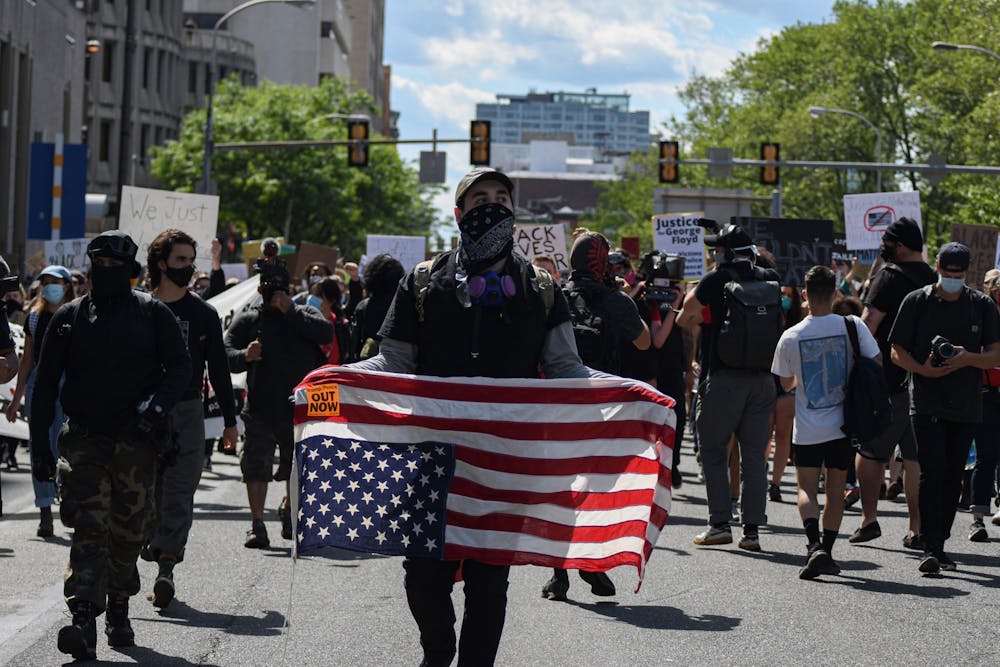A tiny American flag pin was the first thing I noticed my grandmother wearing when I looked at the photo in her obituary. As I read the few words compiled together to paint a portrait of her entire life, I quickly noticed that my mother’s name was excluded in the list of her children. I did not grow up knowing my mother’s white parents. I’ve heard stories. One of them involved my mother being forced to hide in a closet to conceal me, her half-Black newborn baby, from my grandfather, after he arrived home early and unexpectedly during my mother’s visit.
My grandmother died the month before George Floyd’s senseless murder. As I thought about her impact on my life despite never meeting her, the tiny pin she wore in that photo kept crossing my mind. The pin’s importance to her encouraged me to engage with my thoughts about the reality of being Black in America, and the experience of not being accepted by my family because of my race. My grandmother decided to disown her first-born daughter because she married and started a family with a Black man, my father. She lived her life as if I did not exist because I am the daughter of a Black man. My existence didn't fit into her perception of what was socially acceptable, so she decided not to participate in my life. This is a difficult form of racism, one that pushes the boundaries of inherent bonds and reinforces hate.
Some weeks ago, Amy Cooper unapologetically reacted to a Black man asking her to put a leash on her dog like a scene mimicking The Birth of a Nation. Amy Cooper used formulated fear, brewed by an unfounded sense of victimization, to activate her white privilege. Her use of glaring privilege dispersed like second nature because she had been accustomed to that type of behavior her entire life. She did this because she spent her entire life being conditioned to react that way. She had been taught, through the racist norms in our society, that she was not to be questioned — even when behaving in the wrong.
The privilege Amy Cooper has is something Black Americans are unfamiliar with. Black Americans do not have any gainful privileges in the United States. Instead, we have the privilege to be disproportionately killed by the police. We have the privilege to have decades of our lives stolen from us through wrongful convictions and an unjust criminal “justice” system. For decades, we had the privilege of redlining. We had the privilege to be featured as enslaved cotton harvesters on 19th century currency, as a display of economic strength in America, but today, as free people, there isn't a single Black person represented on a dollar bill or coin anywhere in the United States.
Ideas around race in the United States have always been extremely unfair. This nation was built on a system of capitalism that was generated by Black bodies. We subconsciously know the political, social, and systemic issues that uphold racism, but they often go ignored because they are deeply rooted in every aspect of America's lengthy social contract. The power of racism in the United States has recently inspired protests across the nation and around the world. Americans are hurting. Black people are exhausted. Things need to change.
The failure of reconstruction, decades of Jim Crow laws, and continued inequality and discrimination against Black citizens have created the present day issues that Black Americans wake up to everyday. The systematic examples of racism in the United States can be easily found in all corners of our society — the racial wealth gap, the prison system, the education system, employment, policing, housing, and our healthcare system. Until these systems are restructured to represent egalitarianism, Black Americans will continue to struggle to prosper and survive in the United States, and protests will continue to take up space on this country’s streets.
For me, the sight of an American flag is triggering. Now, I think uncontrollably about my grandmother’s pin, and how her definition of being an American could never match mine. For the Black community, the ideologies attached to being an American — freedom, equality, liberty — are inaccessible. Us Black Americans do not have the privilege to look at the American flag as a representation of freedom. The United States has oppressed every single generation of its Black citizens since the nation’s founding. We cannot and we will not repeat the sins of our past almost 400 years later.

SEE MORE FROM JESSICA GOODING:
JESSICA GOODING is a rising College senior from Philadelphia, Pennsylvania studying History and English. Her email address is jgooding@sas.upenn.edu.









